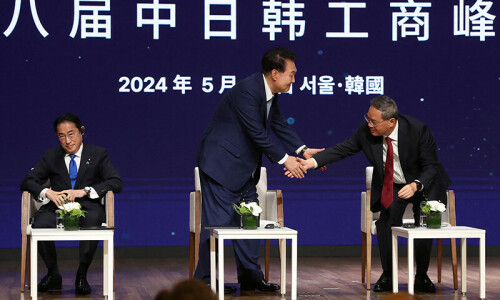WASHINGTON, Aug 29: The United States warned on Friday it would not submit to nuclear “blackmail” from North Korea, accusing its Cold War enemy of souring inconclusive six-nation crisis talks in Beijing with “bellicose and extreme” behaviour.
Pyongyang had made an “explicit acknowledgement” it was now a nuclear power, the State Department said, but backed more talks to find a peaceful way out of the showdown.
Pyongyang threatened during three days of talks to test a nuclear weapon and show it had the means to deliver it, according to the US side.
But the talks ended with a consensus on the need for another meeting — but with no date set.
They also left a huge question unanswered — was Pyongyang bluffing or is it set to send tensions with Washington to boiling point with a nuclear test?
“The DPRK (North Korea) statement is an explicit acknowledgement that the DPRK has nuclear weapons, but the United States will not respond to threats or give in to blackmail,” said Jo-Anne Prokopowicz, a State Department spokeswoman.
The United States has previously said it believes North Korea has enough processed plutonium for one or two nuclear bombs, and assume it has been weaponised.
North Korea is also thought to have the capacity to produce six more bombs using spent fuel rods frozen under international monitoring until a 1994 anti-nuclear deal folded last year.
Despite North Korea’s eyegrabbing statements at the talks also involving the United States, Russia, Japan, China and South Korea, senior US officials insisted they were not surprised at how things had gone.
“Certainly, the North Koreans succeeded in antagonising all five countries with these sort of bellicose and extreme statements,” said a senior Bush administration official.
The US delegation, led by the State Department’s top East Asia hand James Kelly, had been warned that North Korea could make such threats during the discussions, senior officials revealed on Thursday after news broke of North Korea’s threat.
US analysts predicted before the talks that North Korea could make such a declaration if it found itself under pressure — or could simply see such a threat as raising the ante in the three days of talks which end on Friday.
But any decision to conduct a nuclear test would put amount to a crucial test of President George W. Bush’s credibility — after he made clear he will not “tolerate” a nuclear North Korea.
The decision to take North Korea’s statement’s as an “explicit acknowledgement” that it has nuclear weapons, may be seen as an attempt to deprive Pyongyang of a propaganda coup, if it issues a formal declaration of its nuclear status.
Secretary of State Colin Powell launched an immediate round of telephone diplomacy on Friday after the talks ended, calling the foreign ministers of Japan, South Korea, China and Russia to discuss next steps.
“We are pleased that at the meeting a consensus developed that the multilateral process can advance us towards the goal of a peaceful resolution to the North Korean nuclear problem,” Prokopowicz said.
She added that in the six-party setting, North Korea had found it impossible to give “mixed messages,” to concerned parties,
In a chilling verbal blast, North Korea said earlier that its expectations at the three-day talks had been “betrayed” by the “hostile” US policy and that a new round of negotiations was endangered.
“If our reasonable proposal is turned aside at the talks, we will judge that the US does not intend to give up its attempt to stifle the DPRK (North Korea) by force at an appropriate time,” said the North’s official news agency.
“In this case the DPRK cannot dismantle its nuclear deterrent force but will have no option but to increase it.”
China, which did most of the diplomatic legwork to get the Beijing talks under way, characterized the relationship between the United States and North Korea as one of “severe and serious distrust” that needs to be addressed.
Washington has been adamant that the Stalinist state’s nuclear programs must be dismantled before it will consider economic assistance and diplomatic normalization for North Korea. —AFP













































Dear visitor, the comments section is undergoing an overhaul and will return soon.